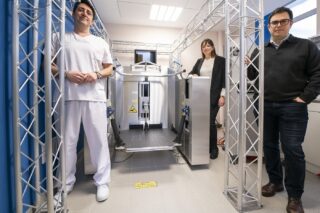This summer, MedicalExpo e-magazine is highlighting ten of its most popular articles published in 2023—an opportunity to review the cutting-edge innovations and digital technology that have made an impact in several healthcare sectors this year. Here is the list of the winners:
1/ Nanorobots: Tiny Movements Towards Major Change
The field of nanorobotics in medicine is as complex and challenging as might be expected, but across the world, researchers are making huge strides with pioneering technologies. For the treatment of cancer, the hope is to be able to deliver precise doses of effective drugs directly to tumors, thereby minimizing the toxic effects on other parts of the body. In neurology, the expectation is that one day tiny “machines” will be able to clear blockages, dissolve blood clots and administer microdoses of medicine within the brain itself.
2/ IDS 2023: Five Trends Set to Shape the Future of Dentistry
Celebrating its fortieth edition this year, the biennial International Dental Show (IDS) took place from March 14-18 in the German city of Cologne. As the world’s leading trade fair for dental medicine and technology, the event showcases progressive innovation and myriads of new products, revolving around the most important concepts and technologies for the dental practices and laboratories of tomorrow. We looked at five of the most influential trends set to shape the future of oral health.
3/ Arab Health 2023: Talking About the Metaverse (in Healthcare)
What, exactly, is the Metaverse and where does it meet healthcare? The Metaverse can be summarized as a major shift in how we can interact with technology. In its original science fiction origins, the Metaverse was a “version” of the internet that was a single, universal and immersive virtual world, facilitated by tools such as artificial intelligence (AI), virtual reality (VR) and augmented reality (AR). It was a central topic at Arab Health 2023.
4/ Keep Track of Your Health From a Video Selfie
“Take a selfie, know your healthie!”—This is the suitable motto used by Canadian company NuraLogix to describe its innovative Anura smartphone app that helps people keep track of their health. In a 30-second video selfie, the app enables accurate, fast and reliable medical grade measurement of a series of health indexes.
5/ Axelife’s pOpmetre Tells You Your Arterial Age
Are your arteries the same age as you are? Or a few years, or even decades, older? While this question may be disturbing, it is French company Axelife’s goal to answer it with its pOpmetre. This medical device uses algorithms coupled with a layer of artificial intelligence in order to calculate, non-invasively and in just 14 seconds, the arterial stiffness of a patient and deduce an arterial age. The good news is that people can act on these results and possibly return to a “normal” age by taking hygienic and dietary measures.
6/ The “AIoT” and its Role in the Future of Healthcare
As a combination of artificial intelligence technologies and the Internet of Things infrastructure, the AIoT is making healthcare smarter and smarter with the goal of improving human-machine interaction and enhancing data management practices. We spoke with Dr. Ted Chang, CTO of Taiwan-based Quanta Computer Inc., who believes that in healthcare we will soon see “data as the new fuel of the future and the cloud as the combustion engine.”
7/ ECR 2023: Advances and Challenges in Medical Imaging
Advances, challenges and the pace of change in medical imaging were major topics at this year’s European Congress of Radiology (ECR) from March 1-5 in Vienna, Austria. Innovative developments in radiology within oncology, cardiovascular medicine, thoracic imaging and rheumatology were among the key subjects discussed. The Congress also returned to hot topics such as the use of artificial intelligence, while homing in on new areas.
8/ Artificial Intelligence vs Antibiotic Resistance
Today, as the world emerges from Covid-19, another severe global health challenge is materializing: the growing ineffectiveness of antibiotics. Bacterial resistance is something that occurs naturally, but the ubiquitous overuse of antibiotics means antimicrobial resistance (AMR) can now be classified as a major global health threat. In this context, could artificial intelligence be a game changer as scientists work to combat this silent pandemic?
9/ Advanced Headset: A New Surgical Reality
With advanced headsets from companies such as ARSpectra now entering the market, augmented reality is on the verge of transforming the way surgeons operate.
10/ ChatGPT AI: The Risks and Challenges to Healthcare
There has been much discussion about OpenAI’s ChatGPT (short for chat-based Generative Pre-trained Transformer) enhancing healthcare and improving working conditions for those in medicine. But does the artificial intelligence bot present dangers as well?











